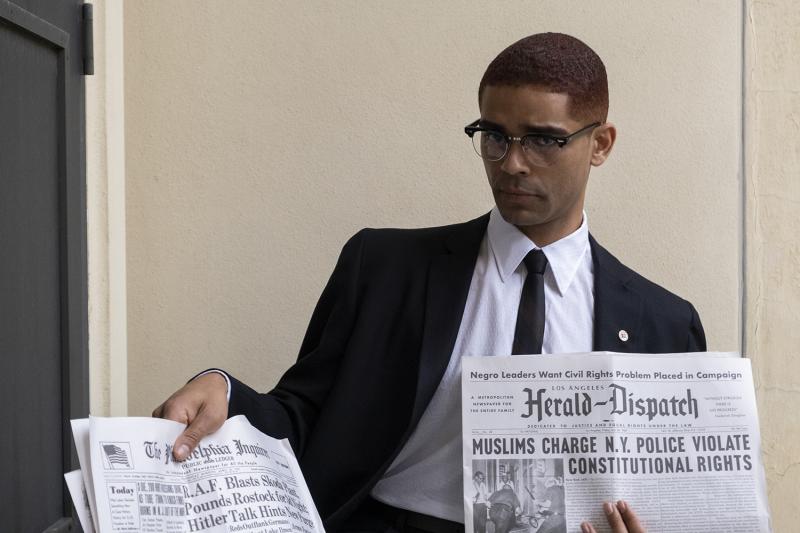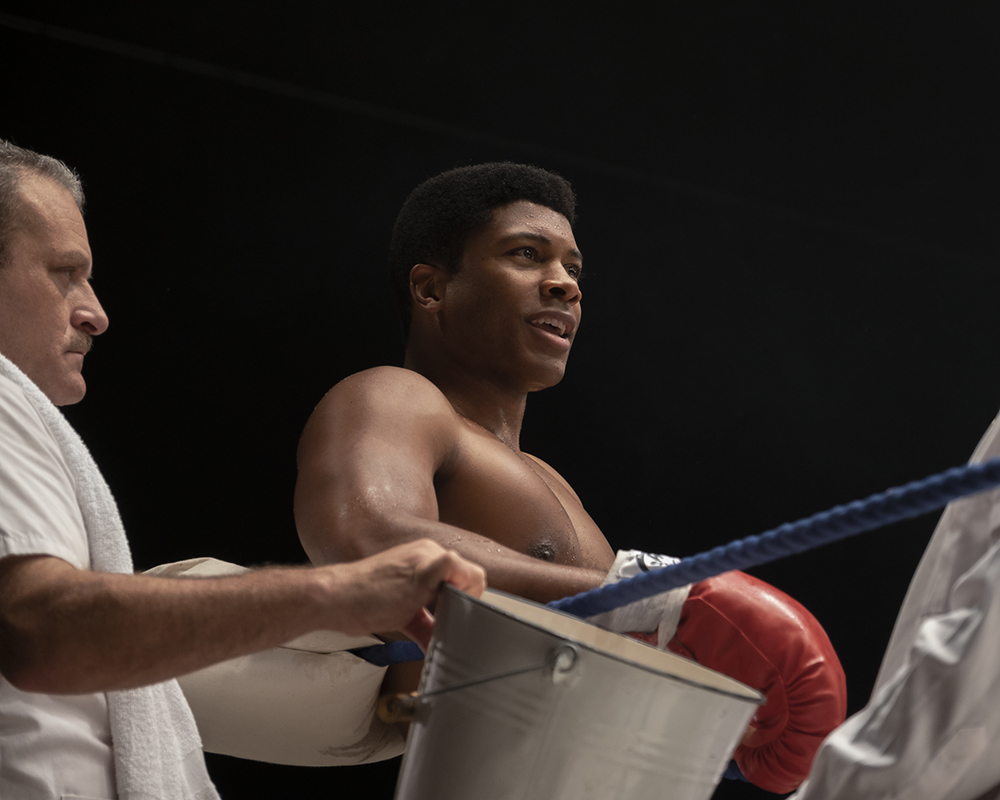One Night in Miami review - black history come alive | reviews, news & interviews
One Night in Miami review - black history come alive
One Night in Miami review - black history come alive
Regina King's directorial debut about a momentous meeting

In 1964, Cassius Clay, NFL superstar Jim Nathaniel Brown, soul legend Sam Cooke and political firebrand Malcolm X gathered for one night in a dingy room at the Hampton Motel. It was a meeting that became a symbol of hope for black Americans.
The events of that evening became the basis of Kemp Powers' 2013 play, and now form the directorial debut for Oscar-winning actress Regina King, who most recently played Sister Night in HBO’s Watchman and won her Academy Award for her role in Barry Jenkins' If Beale Street Could Talk.
On stage, Powers’ play was much more of a chamber piece. King however (along with Powers who adapted the screenplay) has given the story a wider scope, with flashbacks and additional scenes that provide context.
We see the struggles of each of the four protagonists: Brown (Aldis Hodge) might be a celebrated hero, but he still endures racial slurs from those who profess friendship; Cooke (Leslie Odom Jr) may have his dream gig at the Copacabana, but the all-white audience are less than respectful; Clay (Eli Goree), fresh from fighting Hopper at Wembley Arena, is perceived as an upstart rather than the world’s greatest boxer; and Malcolm X (Kingsley Ben-Adir) is in conflict with The Nation of Islam’s unsavoury leader, Elijah Muhammad, making him question his membership in the organisation.  But people don’t just leave the Nation of Islam, and Malcolm needs support. Following Clay’s victory over Sonny Liston, Cooke, Brown and Malcolm X gather for what was meant to be a party. The reality is something much more low-key. In Malcolm’s room, without booze or fellow revellers and flanked by bodyguards from the NI, the four men sit on motel beds and discuss the future of Black America over ice-cream.
But people don’t just leave the Nation of Islam, and Malcolm needs support. Following Clay’s victory over Sonny Liston, Cooke, Brown and Malcolm X gather for what was meant to be a party. The reality is something much more low-key. In Malcolm’s room, without booze or fellow revellers and flanked by bodyguards from the NI, the four men sit on motel beds and discuss the future of Black America over ice-cream.
King has carefully balanced each performance and amount of screen time so that no single player outshines the other. They work in perfect harmony. Malcolm’s fury and fear over what’s at stake balances against Cooke’s charm and passion. Ali’s confidence sits neatly against Brown’s growing cynicism about the gladiatorial nature of the sport that made him famous.
There are stand-out moments however, like Cooke’s Boston gig. Sabotaged by the warmup act, he is pushed into an acoustic rendition of "Chain Gang" that sends shivers down your spine as the audience stamp their feet and clap their hands, and Malcolm gazes on in wonder at what the soul singer can do. The rage, passion and eloquence with which Cooke and Malcolm spar is gripping, but so is the way Goree captures Clay’s vulnerability and strength. Hodge meanwhile is quietly brilliant as a man tired of playing the game (in every sense) and now looking to master his own destiny.
King’s greatest achievement with One Night in Miami is how she, along with Powers, not only put us in the room with these four titans of black America, but also humanises them. The static figures in that iconic image have come alive, to speak again to a new generation tired of suffering and eager for the change to come.
- One Night In Miama is released by Amazon Prime Video on 15 Jan
- More film reviews on theartsdesk
rating
Explore topics
Share this article
The future of Arts Journalism
You can stop theartsdesk.com closing!
We urgently need financing to survive. Our fundraising drive has thus far raised £49,000 but we need to reach £100,000 or we will be forced to close. Please contribute here: https://gofund.me/c3f6033d
And if you can forward this information to anyone who might assist, we’d be grateful.

Subscribe to theartsdesk.com
Thank you for continuing to read our work on theartsdesk.com. For unlimited access to every article in its entirety, including our archive of more than 15,000 pieces, we're asking for £5 per month or £40 per year. We feel it's a very good deal, and hope you do too.
To take a subscription now simply click here.
And if you're looking for that extra gift for a friend or family member, why not treat them to a theartsdesk.com gift subscription?
more Film
 Oslo Stories Trilogy: Love review - freed love
Gay cruising offers straight female lessons in a heady ode to urban connection
Oslo Stories Trilogy: Love review - freed love
Gay cruising offers straight female lessons in a heady ode to urban connection
 Beating Hearts review - kiss kiss, slam slam
Romance and clobberings in a so-so French melodrama
Beating Hearts review - kiss kiss, slam slam
Romance and clobberings in a so-so French melodrama
 Materialists review - a misfiring romcom or an undercooked satire?
Writer-director Celine Song's latest can't decide what kind of film it is
Materialists review - a misfiring romcom or an undercooked satire?
Writer-director Celine Song's latest can't decide what kind of film it is
 theartsdesk Q&A: actor Leonie Benesch on playing an overburdened nurse in the Swiss drama 'Late Shift'
The Guildhall-trained German star talks about the enormous pressures placed on nurses and her admiration for British films and TV
theartsdesk Q&A: actor Leonie Benesch on playing an overburdened nurse in the Swiss drama 'Late Shift'
The Guildhall-trained German star talks about the enormous pressures placed on nurses and her admiration for British films and TV
 Freakier Friday review - body-swapping gone ballistic
Lindsay Lohan and Jamie Lee Curtis's comedy sequel jumbles up more than their daughter-mother duo
Freakier Friday review - body-swapping gone ballistic
Lindsay Lohan and Jamie Lee Curtis's comedy sequel jumbles up more than their daughter-mother duo
 Eight Postcards from Utopia review - ads from the era when 1990s Romania embraced capitalism
Radu Jude's documentary is a mad montage of cheesy TV commercials
Eight Postcards from Utopia review - ads from the era when 1990s Romania embraced capitalism
Radu Jude's documentary is a mad montage of cheesy TV commercials
 The Kingdom review - coming of age as the body count rises
A teen belatedly bonds with her mysterious dad in an unflinching Corsican mob drama
The Kingdom review - coming of age as the body count rises
A teen belatedly bonds with her mysterious dad in an unflinching Corsican mob drama
 Weapons review - suffer the children
'Barbarian' follow-up hiply riffs on ancient fears
Weapons review - suffer the children
'Barbarian' follow-up hiply riffs on ancient fears
 theartsdesk Q&A: filmmaker Dag Johan Haugerud on sex, love, and confusion in the modern world
The writer-director discusses first-love agony and ecstasy in 'Dreams', the opening UK installment of his 'Oslo Stories' trilogy
theartsdesk Q&A: filmmaker Dag Johan Haugerud on sex, love, and confusion in the modern world
The writer-director discusses first-love agony and ecstasy in 'Dreams', the opening UK installment of his 'Oslo Stories' trilogy
 Oslo Stories Trilogy: Dreams review - love lessons
First love's bliss begins a utopian city symphony
Oslo Stories Trilogy: Dreams review - love lessons
First love's bliss begins a utopian city symphony
 Blu-ray: Two Way Stretch / Heavens Above!
'Peak Sellers': two gems from a great comic actor in his prime
Blu-ray: Two Way Stretch / Heavens Above!
'Peak Sellers': two gems from a great comic actor in his prime

Add comment